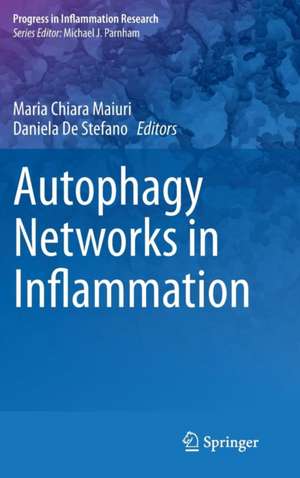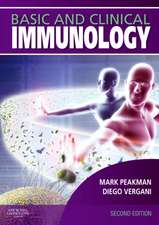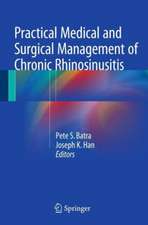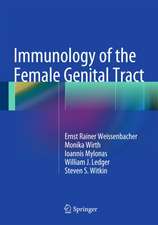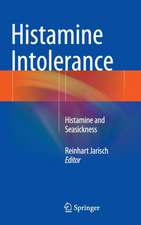Autophagy Networks in Inflammation: Progress in Inflammation Research
Editat de Maria Chiara Maiuri, Daniela De Stefanoen Limba Engleză Hardback – 25 aug 2016
| Toate formatele și edițiile | Preț | Express |
|---|---|---|
| Paperback (1) | 1101.00 lei 6-8 săpt. | |
| Springer International Publishing – 9 iun 2018 | 1101.00 lei 6-8 săpt. | |
| Hardback (1) | 1108.14 lei 6-8 săpt. | |
| Springer International Publishing – 25 aug 2016 | 1108.14 lei 6-8 săpt. |
Din seria Progress in Inflammation Research
- 5%
 Preț: 1615.04 lei
Preț: 1615.04 lei - 5%
 Preț: 1433.10 lei
Preț: 1433.10 lei - 5%
 Preț: 723.05 lei
Preț: 723.05 lei - 18%
 Preț: 950.21 lei
Preț: 950.21 lei - 15%
 Preț: 648.42 lei
Preț: 648.42 lei - 5%
 Preț: 1300.72 lei
Preț: 1300.72 lei - 5%
 Preț: 1103.95 lei
Preț: 1103.95 lei - 5%
 Preț: 1061.94 lei
Preț: 1061.94 lei - 5%
 Preț: 715.35 lei
Preț: 715.35 lei - 5%
 Preț: 1098.63 lei
Preț: 1098.63 lei - 5%
 Preț: 657.90 lei
Preț: 657.90 lei - 5%
 Preț: 717.93 lei
Preț: 717.93 lei - 5%
 Preț: 996.74 lei
Preț: 996.74 lei - 5%
 Preț: 1413.72 lei
Preț: 1413.72 lei - 5%
 Preț: 1102.46 lei
Preț: 1102.46 lei - 5%
 Preț: 1102.82 lei
Preț: 1102.82 lei - 5%
 Preț: 991.73 lei
Preț: 991.73 lei - 5%
 Preț: 1115.86 lei
Preț: 1115.86 lei - 5%
 Preț: 720.31 lei
Preț: 720.31 lei - 5%
 Preț: 1611.76 lei
Preț: 1611.76 lei - 5%
 Preț: 654.23 lei
Preț: 654.23 lei - 5%
 Preț: 1414.64 lei
Preț: 1414.64 lei - 5%
 Preț: 652.77 lei
Preț: 652.77 lei - 5%
 Preț: 1099.94 lei
Preț: 1099.94 lei - 5%
 Preț: 1856.59 lei
Preț: 1856.59 lei - 15%
 Preț: 644.95 lei
Preț: 644.95 lei - 5%
 Preț: 1108.72 lei
Preț: 1108.72 lei - 5%
 Preț: 658.46 lei
Preț: 658.46 lei - 5%
 Preț: 1108.51 lei
Preț: 1108.51 lei - 24%
 Preț: 801.40 lei
Preț: 801.40 lei - 5%
 Preț: 715.19 lei
Preț: 715.19 lei - 5%
 Preț: 1807.08 lei
Preț: 1807.08 lei - 5%
 Preț: 721.40 lei
Preț: 721.40 lei - 5%
 Preț: 991.73 lei
Preț: 991.73 lei - 5%
 Preț: 720.68 lei
Preț: 720.68 lei - 5%
 Preț: 1100.09 lei
Preț: 1100.09 lei - 15%
 Preț: 577.87 lei
Preț: 577.87 lei - 5%
 Preț: 652.77 lei
Preț: 652.77 lei - 5%
 Preț: 653.35 lei
Preț: 653.35 lei - 5%
 Preț: 650.25 lei
Preț: 650.25 lei - 5%
 Preț: 1116.73 lei
Preț: 1116.73 lei - 5%
 Preț: 1096.98 lei
Preț: 1096.98 lei - 5%
 Preț: 1412.62 lei
Preț: 1412.62 lei - 5%
 Preț: 1420.49 lei
Preț: 1420.49 lei - 5%
 Preț: 721.77 lei
Preț: 721.77 lei - 5%
 Preț: 1102.10 lei
Preț: 1102.10 lei - 5%
 Preț: 1099.20 lei
Preț: 1099.20 lei
Preț: 1108.14 lei
Preț vechi: 1166.47 lei
-5% Nou
Puncte Express: 1662
Preț estimativ în valută:
212.07€ • 220.59$ • 175.08£
212.07€ • 220.59$ • 175.08£
Carte tipărită la comandă
Livrare economică 14-28 aprilie
Preluare comenzi: 021 569.72.76
Specificații
ISBN-13: 9783319300771
ISBN-10: 3319300776
Pagini: 471
Ilustrații: XV, 403 p. 20 illus., 16 illus. in color.
Dimensiuni: 155 x 235 x 24 mm
Greutate: 0.76 kg
Ediția:1st ed. 2016
Editura: Springer International Publishing
Colecția Springer
Seria Progress in Inflammation Research
Locul publicării:Cham, Switzerland
ISBN-10: 3319300776
Pagini: 471
Ilustrații: XV, 403 p. 20 illus., 16 illus. in color.
Dimensiuni: 155 x 235 x 24 mm
Greutate: 0.76 kg
Ediția:1st ed. 2016
Editura: Springer International Publishing
Colecția Springer
Seria Progress in Inflammation Research
Locul publicării:Cham, Switzerland
Cuprins
Autophagy in direct pathogen elimination (Xenophagy).- Autophagy and pattern recognition receptors.- Autophagy and inflammasomes.- Autophagy and Antigen presentation.- Autophagy and regulation of T and B cell function.- Autophagy in chronic inflammation.- The complex crosstalk between autophagy and ROS.- Lipophagy.- Autophagy, phagocytosis and entosis: who eats whom?- Which is the cell fate of inflammatory cells ? Autophagic cell death, pyroptosis, netosis, apoptosis, necrosis.- Host defence (virus/bacteria).- Neurological diseases.- Pulmonary diseases (emphysema, COPD, etc.).- Inflammatory bowel disease.- Target autophagy as a novel therapeutic strategy in autoimmune diseases.- Liver and pancreatic diseases.- Obesity.- Aging.- Overview on clinical trials.
Textul de pe ultima copertă
Autophagy principally serves an adaptive function to protect organisms against diverse human pathologies, including cancer and neurodegeneration. Recent developments using in vitro, ex vivo and in vivo models show the involvement of the autophagy pathway in immunity and inflammation. Moreover, direct interactions between autophagy proteins and immune signalling molecules have also been demonstrated. Defects in autophagy - similar to cancer, neurodegenerative diseases and aging - through autophagy gene mutation and/or microbial antagonism, may underlie the pathogenesis of many infectious diseases and inflammatory syndromes. In spite of the increasing awareness of the importance of autophagy in these pathophysiological conditions, this process remains underestimated and is often overlooked. As a consequence, its role in the initiation, stability, maintenance, and progression of these diseases are still poorly understood. This book reviews the recent advances regarding the functions ofthe autophagy pathway and autophagy proteins in immunity and inflammation, focusing on their role in self-nonself distinction, their implications in innate and adaptive immune responses and their dysregulation in the pathology of certain inflammatory and autoimmune diseases.
Caracteristici
Covers the molecular mechanisms underlying autophagy in inflammation Discusses opportunities to target autophagy as a novel therapeutic strategy against inflammation-based diseases Provides an overview on clinical trials
